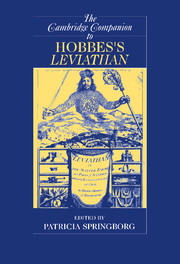Book contents
- Frontmatter
- General Introduction
- Part I: Of Man
- 1 Thomas Hobbes’s Visual Strategies
- 2 Leviathan, the Beast of Myth: Medusa, Dionysos, and the Riddle of Hobbes’s Sovereign Monster
- 3 Sense and Nonsense about Sense: Hobbes and the Aristotelians on Sense Perception and Imagination
- 4 Hobbes on the Natural Condition of Mankind
- 5 Hobbes’s Moral Philosophy
- Part II: Of Commonwealth
- Part III: Of a Christian Commonwealth
- Part IV: Of the Kingdom of Darkness
- Part V: Hobbes’s Reception
- Bibliography
- Index
- Series List
5 - Hobbes’s Moral Philosophy
from Part I: - Of Man
Published online by Cambridge University Press: 28 November 2007
- Frontmatter
- General Introduction
- Part I: Of Man
- 1 Thomas Hobbes’s Visual Strategies
- 2 Leviathan, the Beast of Myth: Medusa, Dionysos, and the Riddle of Hobbes’s Sovereign Monster
- 3 Sense and Nonsense about Sense: Hobbes and the Aristotelians on Sense Perception and Imagination
- 4 Hobbes on the Natural Condition of Mankind
- 5 Hobbes’s Moral Philosophy
- Part II: Of Commonwealth
- Part III: Of a Christian Commonwealth
- Part IV: Of the Kingdom of Darkness
- Part V: Hobbes’s Reception
- Bibliography
- Index
- Series List
Summary
Hobbes's moral philosophy largely consists of the derivation of what he calls 'the laws of nature' (EL, I, 15, 16, 17; De Cive, chs. 2, 3, and 4; Lev., chs. xiv, xv). There is a sense in which this is a virtue-ethics, though one that radically revises Aristotle. The theory is partly concerned with finding a compelling basis for virtues that correspond to Christian ones, or facsimiles of them. It is also supposed to distinguish basic from nonbasic virtues. The theory also assigns meanings to virtue terms intended to command public agreement, thereby stabilising moral rhetoric at a time when Hobbes thought terms like 'good' and 'evil', 'just' and 'unjust' could mean an alarmingly wide range of things. The theory is supposed to be compatible with pretheoretical disagreements about value, but not, in my view, with anything that deserves to be called moral scepticism or relativism.
THE LAWS OF NATURE
The laws of nature are rational precepts for governing one’s actions in ways that will preserve one’s life (Lev., xiv, 3, 63–4/79). Hobbes did not think that the precepts he outlined call for types of behaviour his readers would find unfamiliar. It was a commonplace, for example, that people should, in the words of the Lord’s Prayer, forgive others their trespasses, and the sixth law of nature is that people pardon the offences of those who, repenting those offences, want pardon. People did not need to be told by Hobbes to pardon people, for that was a familiar enough requirement of Christianity. What was not obvious was the place of the law of pardoning among the general moral precepts. What makes the law of pardon the sixth law of nature, for example? Because it is a near consequence of laws of nature that Hobbes thought he had for the first time identified as fundamental.
- Type
- Chapter
- Information
- The Cambridge Companion to Hobbes's Leviathan , pp. 128 - 154Publisher: Cambridge University PressPrint publication year: 2007
- 11
- Cited by

